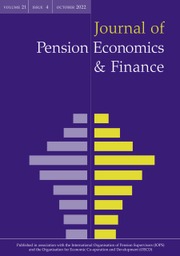Crossref Citations
This article has been cited by the following publications. This list is generated based on data provided by
Crossref.
LUSARDI, ANNAMARIA
and
MITCHELL, OLIVIA S.
2011.
Financial literacy around the world: an overview.
Journal of Pension Economics and Finance,
Vol. 10,
Issue. 4,
p.
497.
Agnew, Julie
Bateman, Hazel
and
Thorp, Susan
2012.
Financial Literacy and Retirement Planning in Australian.
SSRN Electronic Journal,
Pfarr, Christian
and
Schneider, Udo
2012.
Riester-Rente: (k)ein Kinderspiel!.
Vierteljahrshefte zur Wirtschaftsforschung,
Vol. 81,
Issue. 2,
p.
181.
Lusardi, Annamaria
and
Mitchell, Olivia S.
2013.
The Economic Importance of Financial Literacy: Theory and Evidence.
SSRN Electronic Journal,
Kunovskaya, Irina A.
Cude, Brenda J.
and
Alexeev, Natalia
2014.
Evaluation of a Financial Literacy Test Using Classical Test Theory and Item Response Theory.
Journal of Family and Economic Issues,
Vol. 35,
Issue. 4,
p.
516.
Lusardi, Annamaria
and
Mitchell, Olivia S.
2014.
The Economic Importance of Financial Literacy: Theory and Evidence.
Journal of Economic Literature,
Vol. 52,
Issue. 1,
p.
5.
Prabhakar, Rajiv
2014.
What are public attitudes towards financial capability? Evidence from focus groups in London.
Policy Studies,
Vol. 35,
Issue. 2,
p.
131.
Amari, Mouna
and
Jarboui, Anis
2015.
Financial Literacy and Economics Education Among Young Adults: An Observation From Tunisia.
Journal of Business & Finance Librarianship,
Vol. 20,
Issue. 3,
p.
209.
Agarwal, Sumit
Amromin, Gene
Ben-David, Itzhak
Chomsisengphet, Souphala
and
Evanoff, Douglas D.
2015.
Financial literacy and financial planning: Evidence from India.
Journal of Housing Economics,
Vol. 27,
Issue. ,
p.
4.
Farrell, Lisa
Fry, Tim R.L.
and
Risse, Leonora
2016.
The significance of financial self-efficacy in explaining women’s personal finance behaviour.
Journal of Economic Psychology,
Vol. 54,
Issue. ,
p.
85.
Leiser, David
Benita, Rinat
and
Bourgeois-Gironde, Sacha
2016.
Differing conceptions of the causes of the economic crisis: Effects of culture, economic training, and personal impact.
Journal of Economic Psychology,
Vol. 53,
Issue. ,
p.
154.
Massey, Emily
Wyatt, Alyna
and
Smit, Caitlin
2016.
Evaluating financial education initiatives in South Africa: The importance of multiple evaluation approaches.
African Evaluation Journal,
Vol. 4,
Issue. 1,
de Zwaan, Laura
Lee, Chrisann
Liu, Yulin
and
Chardon, Toni
2017.
Overconfidence in Financial Literacy: Implications for Planners.
Financial Planning Research Journal,
Vol. 3,
Issue. 2,
p.
31.
Chen, Jia
Jiang, Jiajun
and
Liu, Yu-Jane
2017.
Financial Literacy and Gender Difference in Loan Defaults.
SSRN Electronic Journal ,
Mindra, Rachel
and
Moya, Musa
2017.
Financial self-efficacy: a mediator in advancing financial inclusion.
Equality, Diversity and Inclusion: An International Journal,
Vol. 36,
Issue. 2,
p.
128.
MITCHELL, OLIVIA S.
2017.
Financial knowledge and key retirement outcomes: an overview of the issue.
Journal of Pension Economics and Finance,
Vol. 16,
Issue. 3,
p.
273.
Nguyen Vu, Nghia
and
Scott, Janine
2017.
Financial Capability: Literacy, Behavior, and Distress.
SSRN Electronic Journal ,
Kaiser, Tim
2017.
Finanzielle Sozialisation und finanzielles Wissen.
Vierteljahrshefte zur Wirtschaftsforschung,
Vol. 86,
Issue. 4,
p.
17.
Suri, Amjad Khan
and
Purohit, Sonal
2017.
An Analysis of Personal Financial Literacy among Expatriates in the United Arab Emirates.
Contemporary Review of the Middle East,
Vol. 4,
Issue. 3,
p.
278.
Ongena, Steven
and
(Ania) Zalewska, Anna
2018.
Institutional and individual investors: Saving for old age.
Journal of Banking & Finance,
Vol. 92,
Issue. ,
p.
257.


